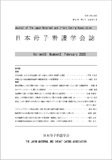Japanese
English
- 有料閲覧
- Abstract 文献概要
- 参考文献 Reference
要旨
目的
病院勤務をしている中堅以上の助産師の職務満足度への影響要因を明らかにする。
対象と方法
産科を有する病院に勤務し、かつ臨床経験が5年以上の助産師を対象とした。職務満足度の尺度は、内的整合性と基準関連妥当性を確認した。分析は多変量解析で、職務満足度を従属変数とし、独立変数が職種間関係、勤務場所、勤務施設の分娩件数、出生証明者氏名欄の職種、助産師としての勤務年数、職位、採用職種、助産業務、配属先の希望採択、結婚経験である。
結果
2063部を分析した。標準偏回帰係数(β)が高い順にみていくと、職種間関係(=0.401)、職位(=0.136)、配属先の希望採択(=0.125)、乳房管理(=0.101)、勤務施設の分娩件数(=0.096)、出産の介助(=0.077)、助産師としての勤務年数(=0.069)、妊婦の健康教育(=0.055)、結婚経験(=0.050)であった。この9項目について、共分散構造分析モデルの適合度を検討し、職種間関係得点、職位、配属希望、乳房管理業務、勤務施設の分娩件数、出産の介助業務の6変数を独立変数とする共分散構造分析を実施した。その結果、職種間関係得点が0.417、職位が0.168、配属希望が0.129、乳房管理業務が0.106、勤務施設の分娩件数が0.079、出産の介助業務が0.078であった。このことから、職種間関係を肯定的に捉えている場合、職務満足度が高くなることが示された。また、職位が高く、配属先の希望が採択されていることも職務満足度を高める傾向がある。そして、乳房管理業務を行い、勤務施設の分娩件数が多く、出産の介助業務を行えていると職務満足度が高くなっていた。
結論
病院に勤務している中堅以上の助産師にとって、職場における職種間の関係を肯定的に捉えていることが職務満足を高める最も効果的な要因であることが示された。
Purpose
To elucidate factors influencing job satisfaction in hospital-based midwives in the mid-career or later stages.
Method
Participants were midwives with ≥5 years clinical experience employed by hospitals with an obstetrics or obstetrics/gynecology department. To measure job satisfaction, we used a scale whose internal consistency and criterion-related validity had previously been confirmed. Multivariate analysis was performed with job satisfaction as the dependent variable and the following independent variables extracted from prior research and literature reviews: interprofessional relationships, place of work, number of deliveries at the hospital, profession of those responsible for signing the birth certificate, years of experience as a midwife, position at work, occupation when hired, responsibilities, departmental assignment request was met, and married or previously married.
Results
In total, 2063 responses were analyzed. The top 9 factors influencing job satisfaction according to standard partial regression coefficients were: interprofessional relationships (β=0.401), position at work (β=0.136), departmental assignment request was met (β=0.125), lactation consulting responsibility (β=0.101), number of deliveries at the hospital (β=0.096), delivery assistance responsibility (β=0.077), years of experience as a midwife (β=0.069), responsible for the health education of pregnant women (β=0.055), and married or previously married (β=0.050). Goodness of fit of covariance structure analysis models for these 9 factors was examined using a chi-squared test, goodness-of-fit index, adjusted goodness-of-fit index, root mean square error of approximation and Akaike information criterion. Covariance structure analysis of the following 6 independent variables was performed and a value obtained for each factor: interprofessional relationships score (0.417), position at work (0.168), met request for departmental assignment (0.129), lactation consulting responsibility (0.106), number of deliveries at the hospital (0.079), and delivery assistance responsibility (0.078). These results indicate that job satisfaction was high when interprofessional relationships were perceived positively, when the participant's position at work was high, and when their request for departmental assignment was met. Job satisfaction was also high when participants were responsible for lactation consulting and delivery assistance and when the number of deliveries at the hospital was high.
Conclusion
This study suggests that positive perception of interprofessional relationships is the most effective factor for increasing job satisfaction in hospital-based midwives in the mid-career or later stages.
Copyright © 2020, The Japan Maternal and Infant Caring Association All rights reserved.


